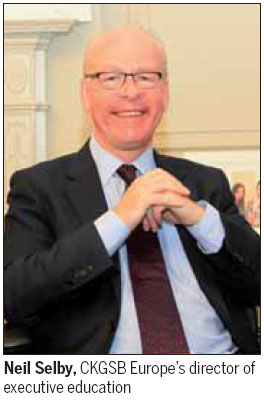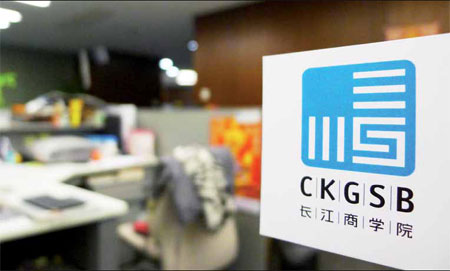East meets West at new business class

China's unique business culture is gaining recognition from international academics
As China's importance in the global economy grows and many successful Chinese entrepreneurs emerge onto the world scene, some of the country's business culture is slowly making its way into Western academic theories.
Helping with this knowledge shift is the dual executive master of business administration program launched this week by China's Cheung Kong Graduate School of Business and the Swiss business school IMD.
The dual EMBA program, which runs over 20 months, is structured into a "foundation stage", which teaches students mainly theory and a "mastery stage", which focuses on case studies.
"We will begin by forging an understanding of comparative historical, philosophical and social systems," says Neil Selby, CKGSB Europe's director of executive education.
"Topics such as power and authority, commerce and exchange, and innovation and creativity will be grounded in an East and West context," says Selby, who previously worked as the international director of Oxford University's Said Business School.
Hailed as the first EMBA degree to give China and the Western world equal importance, the course aims to take an equal number of Chinese and Western students and to help them interact with each other.
For example, the students as a group may visit China's Terracotta Warriors in Xi'an, a symbol of China's ancient civilization, and then talk about their experience.
"So they may ask each other, 'What does it mean to you?' You need to have these conversations to unearth the psychological foundations that are informing people," Selby says.
For this reason, the Chinese and Western students will spend a lot of time together. During the foundation stage, they will study for three weeks at IMD's campus in Lausanne, and another three weeks in CKGSB's campus in Beijing.

The mastery stage has five weeks of class time, focusing on meeting businesses in the real world, spread across London, Africa, Shanghai, Beijing and Lausanne.
It also involves a lot of study of academic theories followed by an examination, while the mastery stage involves writing six essays or assignments. The foundation stage runs from February to August, and the mastery stage from September to the following September.
"At the graduation ceremony, all the essays the students have done will be bound together and presented to them by a well-known alumnus," Selby says.
"That represents the thinking they've got out of these 20 months, which we hope will be the equipment they'll need to lead the way between China and the world."
CKGSB, which was set up more than 10 years ago with the financial backing of the Li Ka-Shing Foundation, prides itself on teaching China's business elite through its Chinese EMBA programs.
Its large pool of notable alumni has created a natural advantage for the school's European expansion, as alumni there will be able to interact more with Chinese business leaders through the alumni network.
The schools' alumni base includes 25 percent of China's most influential businesspeople, who lead companies responsible for 13.7 percent of China's GDP, more than $1 trillion (721.4 million euros) in sales and 20 percent of China's top brands, according to CKGSB statistics.
Admissions for the dual EMBA program will not be based on examinations. Instead, applicants will be asked to submit an essay explaining why they wish to take this program, followed by an interview. They should also have about 10 years of industry experience.
Selby says the school will especially look for "intellectual curiosity" in the applicants. He says Chinese applicants should already be leading the European operations of their businesses or have the opportunity to do so in the future, and vice versa for European applicants.
Although the students' graduation results will not be graded, a few students who have demonstrated exceptional achievement will be on the dean's list, as acknowledgement of their good work.
Master of business administration degrees originated in the US in the 19th century as the country industrialized and companies sought scientific approaches to management. They later spread to Europe and Asia, and more recently a lot of its management theories have been influenced by Japanese business management strategies.
But Selby says some of the US or Japan-focused academic theories may not be applicable to China, which is an extremely fast-growing country with business strategies influenced by a different historical and philosophical framework. So CKGSB has adjusted its program by incorporating some Chinese business case studies and theories.
He says one adjustment was the idea of level 5 leadership, which was developed by US business consultant Jim Collins to describe a leader who empowers his or her team and drives it toward a particular strategic direction.
But Selby says this concept may not work in China, because Chinese leaders often operate on the ground, getting first-hand information alongside the workers.
"Emerging markets don't stay stable," he says. "If you empower people, they may make mistakes. So a leader needs to be as much at the top as on the front line, which is certainly not one of the principles of level 5 leadership."
Selby says academic business case studies in China need to be constantly refreshed as the market is developing so quickly. "They have to be six months old," Selby says. "If they're four years old then it's a waste of time."
Before the launch of the dual EMBA program, CKGSB already had some success teaching executives in Europe by hosting China Strategy Challenge, a three-and-half-day executive program.
First hosted at Judge Business School in Cambridge, England, in 2012, it was again hosted at IMD last year, and Selby says this program will continue on a regular basis.
Notable former students of the program include Tom Hunter, a Scottish entrepreneur and philanthropist, and John Neill, chairman and chief executive officer of Unipart Group, a British company involved in logistics, supply chains, manufacturing and consultancy.
With a similar concept of bringing Chinese and Western executives together and encouraging them to share opinions, the China Strategy Challenge last year attracted about 70 students from China and the West.
Selby says being present at the student discussions taught him interesting things about how China does business.
One of them was the idea that China's economy works in "black and white", which means night and day. "Europeans need to understand the speed and commitment of the Chinese economy. You have to be all in, not half in," he says.
Another concept is the "black horse and white horse", which is what Chinese executives imagine themselves and their European counterparts to be respectively. The black horse, or Chinese businessperson, is dynamic, energetic and makes things happen, while the white horse is an elegant animal in an aristocratic setting.
"The Chinese have different pictures of how Europe works. They have a lot of respect for the European sense of culture, technology and brands," Selby says.
Encouragingly, Selby has noticed that Chinese and European students are eager to express their opinions, listen attentively to each others' views and accept their differences.
"Both sides recognize their differences, and hanker for a middle road. This is what we want to achieve, a group of people who can build a sustainable road for China and Europe."
cecily.liu@chinadaily.com.cn
| Cheung Kong Graduate School of Business in China prides itself on teaching country's business elite through its EMBA programs. Provided to China Daily |
(China Daily European Weekly 03/14/2014 page21)
Today's Top News
- Takaichi must stop rubbing salt in wounds, retract Taiwan remarks
- Millions vie for civil service jobs
- Chinese landmark trade corridor handles over 5m TEUs
- China holds first national civil service exam since raising eligibility age cap
- Xi's article on CPC self-reform to be published
- Xi stresses improving long-term mechanisms for cyberspace governance































